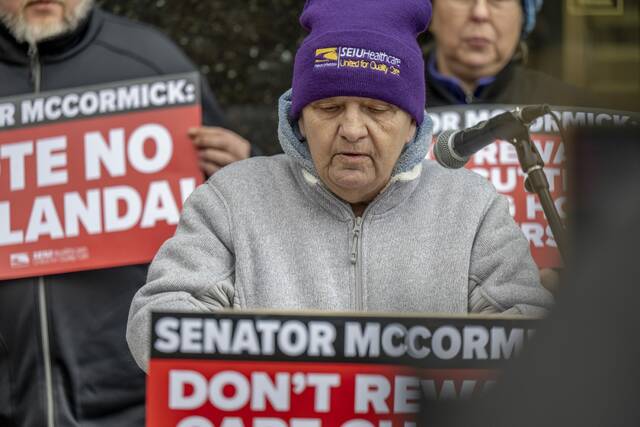David Munchinski spent nearly 26 years incarcerated for a crime he didn’t commit.
He then waited nearly a decade more to go to trial in the federal lawsuit he filed against the men he said wrongfully convicted him on two counts of first-degree murder.
In December, Munchinski, who had long ago been diagnosed with Parkinson’s disease, asked to be deposed on video. The 69-year-old wanted to preserve his testimony in case something happened to him.
But attorneys for the Pennsylvania State Police and Fayette County prosecutors said they weren’t ready — that the timing was too close to the scheduled Jan. 10 trial date.
The deposition was delayed until February, and the trial pushed back to the end of March.
On Feb. 21, Munchinski, dressed in a dark suit and turquoise shirt with a tie and medallion around his neck, began his direct examination. He testified for about five hours over two days.
When his attorney asked him, at the end of his testimony, what he wanted out of the lawsuit, Munchinski didn’t talk about money.
All he wanted, he said, was to get his time back.
But it was too late.
He died that night.
His lawsuit — now to be handled by his estate — settled on Monday for $8.75 million.
“David never got to have his day in court, which he was very much looking forward to and very much wanted,” said attorney Noah Geary, who represented Munchinski for 22 years — through his criminal appeal and civil case. “What they did to Munchinski, no human being should do to another human being.”
The criminal case
On Dec. 2, 1977, James “Petey” Alford, 24, and Raymond Gierke, 28, were killed at Gierke’s home in Bear Rocks, Fayette County.
The crime went unsolved for five years until an informant, Richard Bowen, gave a statement to police. In the first statement, he never mentioned Munchinski’s name.
But in a second statement on Sept. 9, 1982, Bowen was taken to the Fayette County DA’s office and allegedly told prosecutors Gerald Solomon and Ralph Warman that he drove Munchinski and Leon Scaglione, of New Alexandria, to Bear Rocks that night.
The statement was recorded on a cassette tape, but it was never turned over to the defense.
Bowen gave a third statement on Oct. 21, 1982, and Munchinski was charged the next day.
From the beginning, the Latrobe native proclaimed his innocence, saying he was at home with his wife and two young children at the time of the slayings.
Scaglione and Munchinski went to trial together in 1983. Munchinski testified on his own behalf.
The jury could not reach a unanimous verdict, and the case ended in a mistrial.
The two men were tried separately three years later.
In his second trial, Scaglione admitted his role in the killings and denied that Munchinski was involved. Scaglione was convicted.
At his own trial, despite denying any role in the brutal shooting deaths, Munchinski was convicted, too.
He was sentenced to two consecutive terms of life in prison with no chance for parole.
“I’m innocent,” he said in his deposition. “I was innocent then. I’m innocent now.”
Later, he added, “always have been. Always will be.”
Related:
• Munchinski to seek compensation in 'Bear Rocks' murders• Ruling stuns Munchinski stepchildren
• Prosecutors weigh retrial of 'Bear Rocks Murders' defendant
Lengthy appeals
After his conviction, Munchinski immediately started the appellate process, which went on for decades.
During that time, it was revealed that Bowen, who later committed suicide in a jail cell, wasn’t even in Pennsylvania at the time of the Bear Rocks murders. He was in Oklahoma.
Bowen later admitted that the prosecutors and state police fed him the information they wanted him to testify about.
Munchinski and his attorneys also discovered the prosecutors and state police withheld at least a dozen pieces of exculpatory evidence in both trials and in post-conviction appellate proceedings later — even after being given explicit instructions by a judge to turn the evidence over.
Still, appeal after appeal in state court failed — despite evidence piling up that Munchinski never had a chance at a fair trial.
It wasn’t until August 2011 that U.S. Magistrate Court Judge Lisa Pupo Lenihan ruled in Munchinski’s favor in his federal appeal.
After serving 25 years, 266 days in prison, he was finally released on bond while the commonwealth appealed Lenihan’s decision to the Third U.S. Circuit Court of Appeals.
Ten months later, the Third Circuit issued its opinion.
“The scope of the [exculpatory evidence] violations here is staggering,” the three-judge panel wrote. They found that “Munchinski has demonstrated his actual innocence by clear and convincing evidence.
“When all of the evidence is considered as a whole, we are convinced that no reasonable juror could rationally vote to convict.”
The appellate court also wrote that it appeared the commonwealth’s decision to appeal Lenihan’s decision — in light of all the evidence of prosecutorial misconduct that had been presented — “may have been motivated by considerations external to this particular case, because it is difficult to discern any significant justification on this record for continuing to defend what is now acknowledged by all to be a badly tainted and highly suspect conviction.”
It ordered the state to either retry Munchinski within 120 days or release him.
Fayette County Judge Nancy Vernon signed an order on June 14, 2013, dismissing the charges against Munchinski and prohibiting them from being refiled.
“They never conceded anything. They fought it all the way,” Munchinski said in his deposition. “They’re still fighting it. They’re just dragging it out. Everything they can appeal, they appeal.”
How do you measure 26 years?
On Sept. 3, 2013, Munchinski filed a federal civil rights lawsuit alleging malicious prosecution against Solomon and Warman — both of whom had gone on to become Fayette County judges — and the estate of Pennsylvania State Police Sgt. George Fayock, who oversaw the investigation and died in 2007.
“There was no evidence, physical or otherwise, linking the plaintiff to these crimes,” the lawsuit said.
The lawsuit alleged that because the defendants had no probable cause to arrest Munchinski initially, that Solomon, Warman and Fayock’s estate were not entitled to immunity — the principle in law that protects public servants from being sued for actions taken in their official capacity.
As a result of what the prosecution team did, the lawsuit said, Munchinski suffered “emotional distress, humiliation, stress, fear, anxiety, and embarrassment; wrongful incarceration and the loss of his liberty for 27 years; the stigma of being convicted of murder and of being incarcerated for 27 years; property losses; past, present and future emotional trauma, physical and psychological harm; past, present and future medical expenses; past lost earnings and lost earning capacity; future loss of earnings and lost earning capacity; the loss of the enjoyment of life; the separation from his wife and children for over 27 years and the loss of other familial relationships.”
In the recorded deposition, Munchinski remained stoic, even as he talked about all of those things. The video shows the toll the Parkinson’s had taken on Munchinski — he struggles to get comfortable in his chair, his head moves involuntarily, as do his hands.
Despite that, the attorneys representing the defendants in the lawsuit objected to the deposition even being taken.
“His credibility and demeanor should be presented to the jury live,” they said.
Over their objection, the deposition went on.
Munchinski talked about what his life was like in prison — the fear, the constant sense of dread, never being able to fully let his guard down, never making real friends.
He served his time at the now-closed maximum security State Correctional Institute at Pittsburgh and SCIFayette.
When he first got to prison, Munchinski said corrections officers put a foot-long shank on the shelf of his cell. He thought they were trying to set him up, so he never touched it, he said.
He once saw a man get stabbed in the stairwell on the way to the yard.
And even though the inmates got to go to the “yard” three times a day, Munchinski said, it wasn’t actually a yard.
It was an area covered in asphalt, where they sometimes played bocce ball or lifted weights. Everyone out there, he said, was angry.
“Nobody likes it,” he said. “Everybody’s pissed off all the time.”
He didn’t smell fresh-cut grass for more than 25 years.
Throughout his incarceration, Munchinski said he always worked — for 10 years as a clerk for a unit manager and for 15 as a clerk dealing with the making of license plates.
He described the food as “slop” and said it was rare to leave a meal full. There was never fresh fruit or vegetables. Inmates could buy food at the commissary — the healthiest things there, he said, were packs of ramen.
Munchinski also spoke about all the things he lost after his arrest. His wife left, and his two children went to live with his mom in Florida.
He never got to attend any of their Little League games, or school concerts or dances.
And even though he could call his family, it was expensive — $1 per minute — and his earnings were just 35 cents an hour.
His time, he said, passed “slow. Very slow.”
“I was a lifer.”
After his release from prison, Munchinski went to Florida to live with his daughter, Raina Kousaleos.
Although his Parkinson’s disease made it impossible for him to work, he was able to volunteer for his church there, including distributing food on Thursdays.
But as the years progressed, Munchinski said in his deposition, he lost more and more control of his body. His balance declined, his speech was impacted, he could no longer handle papers, he would fall.
“My fine motor skills are shot,” he said in the recording.
He described being in constant pain.
“In a very true sense, he didn’t get to enjoy much of his freedom,” Geary said.
The settlement
Munchinski’s deposition testimony, knowing that he died hours later, is haunting.
And because he was never cross-examined, Geary said, the recording could not be used at trial.
“That was frustrating beyond belief — so we had to settle,” the lawyer said. “We were full bore wanting to try the case before a jury.”
Geary criticized the attorneys for the defendants in the civil suit for delaying the deposition and trial, noting that they filed appeals in the case up to the Third Circuit three separate times.
“Of course, they were ready,” he said.
Geary said the funds for the settlement will come from Fayette County and the state police, with $3 million coming from the county and the rest from the state police.
The attorney who represented Fayette did not respond to a request for comment, nor did Solomon nor Warman, who have both retired.
The state police said they could not comment on pending litigation, although the case is listed as closed on the court docket.
As part of the settlement, Geary said, Fayette County must issue a formal, public apology in the form of a news release within 30 days.
“That was important to David before he died,” Geary said, “and it’s important to Raina now that there’s an apology from Warman and Solomon.”
Kousaleos said on Friday that she and her family are trying to make sense of what happened.
“My family and I are devastated at the sudden and unexpected loss of my father,” she said. “His unexpected passing is even more difficult and hard to accept when you think about the nearly 30 years that were taken from my father and our family due to his wrongful conviction and incarceration.
“We wish we could have that time back.”








